Apple Intelligence is seemingly being lapped in the AI race, but it’s hard to determine who’s really winning when the competitors change the victory condition every few laps.
Humans are a tribal species that thrives on competition and debate, and it’s no different when it comes to technology. Whether you’re talking about Android versus iPhone or PlayStation versus Xbox, people love to pick sides.
It’s no different for the various artificial intelligence systems available. However, almost universally, it seems people and pundits are calling Apple Intelligence the biggest loser — even when compared to systems that haven’t released yet.
I remember when this whole “Artificial Intelligence” thing started. It was and still is a bad name for an evolution of technology that has nothing to do with computers knowing anything.
Intelligence is literally defined as the ability to acquire and apply knowledge or skills. Artificial Intelligence does neither.
The so-called “artificial intelligence” is just a brute-force technology that works best when it has access to mass amounts of data stolen by mostly large corporations from the web. It can’t think, it can’t reason, and it doesn’t have knowledge — it has access to knowledge.
It then parses that knowledge into a soup that sometimes makes sense, and sometimes doesn’t. But it does it so confidently, that Google likes to put it forth as gospel, eager for people to scoop up, right or wrong, credited or not.
It’s impossible to win a race with a moving finish line
I’ll say it up front in case anyone is confused. I’m not here to defend Apple’s current state in Apple Intelligence.
Let’s be frank — Apple’s position isn’t ideal, and I’m not going to try and convince anyone it’s getting an unfair bad rap. It deserves the criticism it gets.

Apple Image Playground Sketch style (left) and ChatGPT via Siri interpreting that (right)
There is a narrative going around that Apple wasn’t even thinking of this technology until pressure mounted in late 2023. While it is possible Apple wasn’t targeting a 2024 release, I doubt they completely missed that ChatGPT and Google Bard were part of a zeitgeist.
Apple has been working on computational photography for many iPhone generations, from the bokeh effect introduced with iPhone 7’s dual cameras to the intensive camera systems on iPhone 16 Pro Max. These advancements in iPhone photography necessitated a new chipset that would take the load off of the GPU — the Neural Engine.
The Neural Engine debuted in the iPhone 8 with the A11 Bionic. While no one was calling these advanced models “AI” at the time, it was the foundation of the technology we use today.
OpenAI began research for generative AI models in 2016, which is when Apple, Google, and Qualcomm also announced similar research projects. Apple revealed it was researching AI in December 2016, revealed the Neural Engine in 2017, then ChatGPT was released in 2022, and Apple Intelligence in 2024.
That doesn’t mean Apple didn’t already have so-called AI before Apple Intelligence. A lot of early AI wasn’t even generative. Google and others were waltzing on stage talking about AI when the technology they showed wasn’t fundamentally different from the advanced ML used on iPhone at the time.
Apple wasn’t behind on AI in 2016, 2022, or 2024, it’s been in the game since it started work on Project Titan in approximately 2015. For those that have already forgotten, Apple had always planned on it being an autonomous driving unit with AI.

Apple Car wasn’t going to drive itself without AI
Increasing pressure to announce something, anything related to AI in 2023, seemingly forced Apple’s hand. It can be seen in how the company talked about AI before WWDC 2024.
The executives even went out of their way to avoid saying AI to the point it was a running joke in the tech community. Then suddenly, everyone at Apple was saying “AI.”
An internal adjustment occurred as they came up with their strategy on the fly. Market pressures from the stockholders, customers, and global influences forced Apple to come to the uncomfortable conclusion that the iOS cycle they had planned wasn’t going to work.
Apple Intelligence had to be revealed in June or the company would face incredible pushback. Without AI, Apple was “behind” and people would turn to competitors that offered access to this new popular technology.
Let’s not forget that at the time the existing models were doing little more than producing wild hallucinations and poorly conceived student essays. Even so, Google and OpenAI were promising a technology so grand and dangerous it could destroy humanity, eliminate all work, and collapse economies.

Ah yes, glue on pizza. AI is a world-threatening cataclysm indeed.
While this Skynet level of AI never showed up, people ate up the idea, and Apple wasn’t part of the conversation. Tech folk kept repeating the lie that AI was changing the world and Apple wasn’t going to be part of the revolution.
ChatGPT and Google Gemini are hammers, not self-aware computers. They help with very specific situations and make some really cool stuff.
I can’t help but be in awe at some of the generated images and videos. Interacting with a chatbot can be entertaining and unique, like talking to a video game. Zork writ large.
There are people out there producing some really interesting stuff thanks to AI. When the technology is applied to science, research, analysis, and other academic or enterprise uses, it can do amazing things.
But let’s not fool ourselves. It is already having a detrimental effect on the internet.
AI may not kill humanity directly, but it will kill the internet
The real threat of AI from companies like Google and ChatGPT is the death of the information industry as a whole. Google started life with a goal to organize the world’s information, now it is using that access to eliminate the need for the web outside of Google search results.
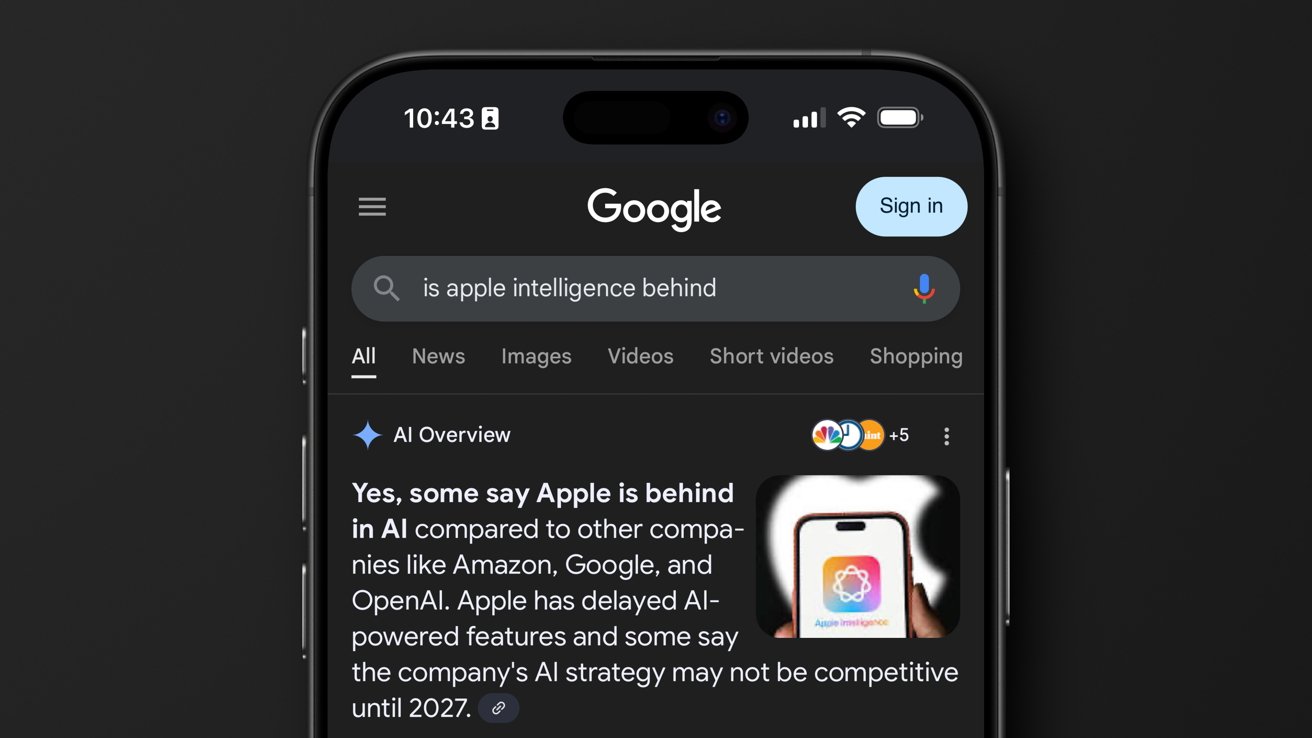
No need for websites when everything is accomplished in the search bar
It’s thanks to companies like Google that we have a web built around ads and tracking users. That ad system pays the bills for publications so information can be researched, written about, published, then indexed by Google.
Google has broken that cycle of trust many times over the years. It first did it by boiling the frog, gradually taking more of this revenue for itself, squeezing out everybody else. This has already forced the closure of many, many enthusiast sites, and several AppleInsider employees are refugees from that.
It is doing it now by amalgamating several results from multiple sites into one AI summary. It now leads most searches with that, accuracy, accreditation, and payment be damned.
Inevitably, the AI will increasingly feed on AI-generated content. This closed feedback loop reinforces specific ideas, eliminates human publication, and ultimately creates a web where the only place you can get any information is from trillion-dollar companies.

AI works better as a tool for humans, not a tool that replaces humans
The only way out of this mess is to stop treating AI like some kind of all-knowing tool that replaces human work. It can accelerate and enhance work done by humans, but it will never replace it.
Apple could face a similar dilemma with Apple Intelligence as app intents and LLM Siri are finally rolled out. If users can get all of the information they need via voice interactions with Siri, there won’t be much point for opening the app itself.
Developers with sprawling UI elements and beautiful design could lose ground to utilitarian single-screen apps that interact solely through generative AI. Apple’s on-device systems will be front and center, benefiting from developer’s hard work, but without good ways to monetize apps beyond active service subscriptions.
All of these companies have a responsibility to think about how the changes brought about by AI will affect incomes the world over. Hopefully they’ll all realize that AI can be dialed back in some respects to ensure humanity can still shine through, whether it’s via human-written articles or app UI.
Apple Intelligence is good, actually
When Apple finally revealed Apple Intelligence, I was excited by everything they shared. It was on-device, private, secure, and not actively training on user data.

Apple Intelligence is useful, personal, and private unlike other AI tools
Apple’s AI tools were smart, if boring. Rather than promise lies like a thinking computer, Apple gave us generative autocorrect, writing tools, and system-wide summaries.
Image Playground was and is a terrible attempt at competing on that front. It was somewhat excusable during the beta cycle, but nothing has changed since that bad superhero Mom example during WWDC, and that’s not sustainable when competitors release new versions constantly.
Though, I do think Image Playground needed to release to help see how users would take advantage of the model, kind of like Animoji or Memoji. It acted as a working example of Apple Intelligence in something more tangible than grammar checks.
But yes, the images it makes are terrible if not horrific. Genmoji is neat and useful though.

Using ChatGPT via Siri eliminates privacy and data harvesting concerns
Apple even tied ChatGPT into Siri and its Apple Intelligence tools, but in a smart way that ensures user privacy. The implementation isn’t dissimilar to how Siri calls out to Google privately to conduct a search.
Of course, none of this mattered because the doom patrol was out in force to say how behind Apple was. Sure, it couldn’t make a Pixar-grade image from a prompt, but the other tools were useful and most importantly, built into the devices they already owned.
From the September release to today, many people have discussed just how far behind Apple is in this AI race. I think it comes down to a perception issue.
Outwardly, Apple is behind. Why is anybody’s guess.
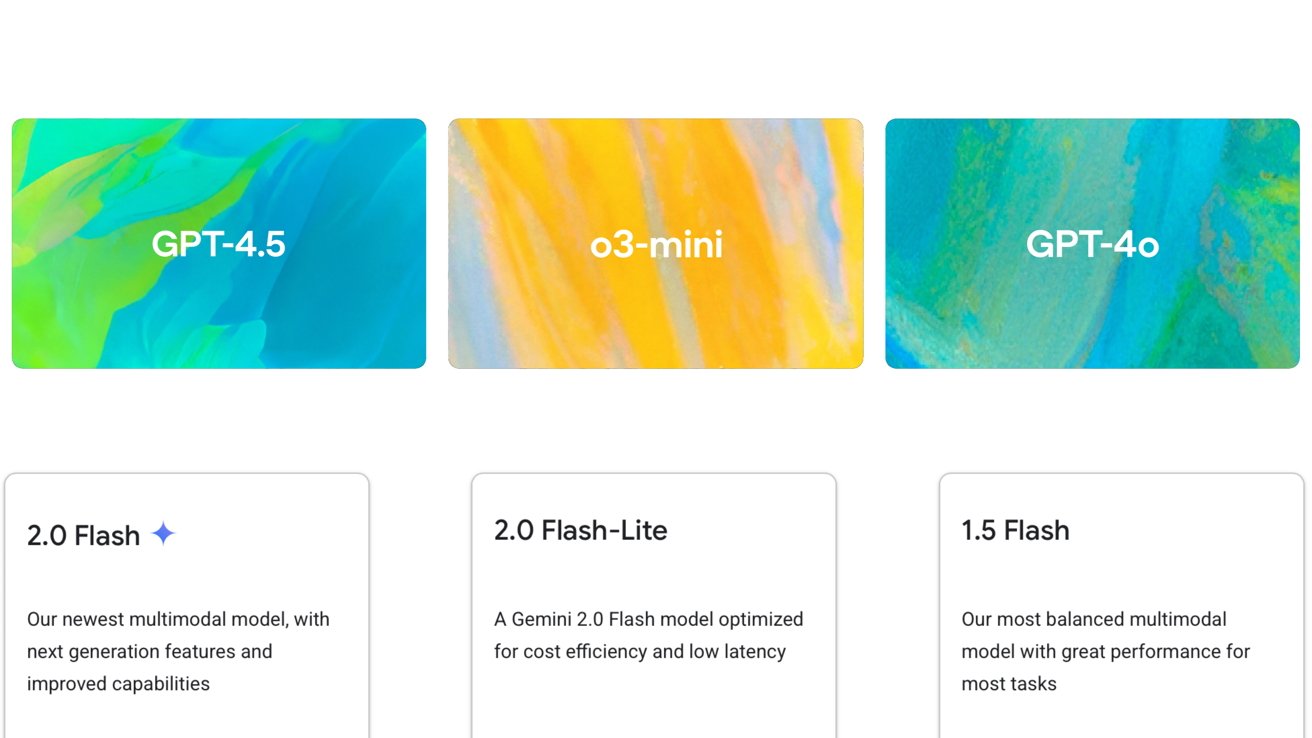
Version after version of increasingly small gains in AI. Image source: OpenAI
Apple isn’t shipping new, obtusely named models every week with granular improvements and made-up new milestones. The executives aren’t promising to end humanity’s need for work.
Apple is doing what it does best — working internally until something is ready, then releasing.
In fact, Apple Intelligence might be one of the few examples of Apple releasing something before it was ready. My guess is that they had planned to announce all this at WWDC 2025, and we’d have gotten a more polished version of what we have today this fall.
Instead, Apple has been trying to get something new to say about Apple Intelligence with every iOS 18 release. It’s all been done in the name of playing catch-up with competitors that aren’t even following the rules of their own race.
They invent new terms and new goalposts to celebrate empty victories at every turn. It’s all very disingenuous, and AI fatigue has already set in.
I ask everyone all the time, here, in the AppleInsider Podcast, among friends and family, and even just people I’m conversing with in public – “what have you done with AI?”
Really think about it.
People don’t know what AI is for or what it can do for them, just that it’s supposed to be good and Apple is behind. “It’s Brawndo, it’s got electrolytes.”

The increasingly accurate film/future documentary, ‘Idiocracy’ had everyone talking about electrolytes. Image source: ‘Idiocracy’
I’ve tinkered with AI from other companies, and they’re interesting, but I’ve not found anything that’ll help me directly. To be fair, I’m not exactly the target audience for many of the offered tools. I’m not coding with GitHub Copilot or flooding the internet with slop images and articles in an attempt to make pennies in ad revenue.
I am writing, though, and I am using Apple products. So, the only AI that’s made any difference in my life is actually Apple Intelligence.
It’s not huge, and I’m not yelling from the rooftops or anything, but it is a difference. But that’s okay, because it is having a positive effect in my workflows without sacrificing anything, and that’s what good technology is about. It doesn’t always have to be a big deal.
Summaries on notifications and mail, even when wrong, are useful for triage. Instead of getting a Slack notification that’s so long it ends in an ellipsis, I just get the gist in a summary.
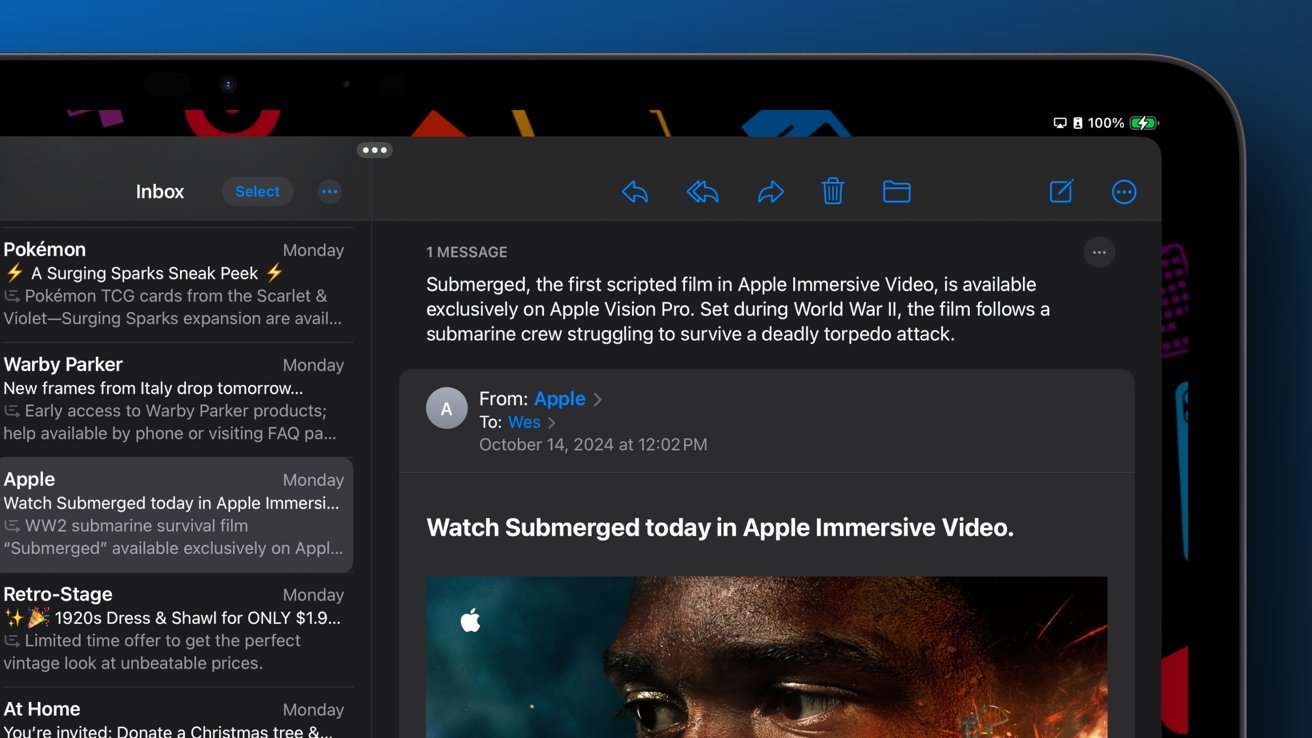
Mail summaries are incredibly useful
We’re awash with email here at AppleInsider. Hundreds if not thousands a day. I can see what the actual point of whatever random email I get without opening it. Apple Home isn’t packing my notifications thanks to grouping and summaries.
Writing tools have replaced Grammarly, a $150 per year subscription. And, for what it’s worth, Grammarly got worse when it implemented artificial intelligence.
I can take a screenshot of a table on a website, ask Siri to send it to ChatGPT, and give me the HTML version of that table, and get it. It still needs to be deeply proofread to be sure it’s accurate, but it’s faster than creating that table from scratch, and hand-coding the HTML.
These are quaint use cases and not stealing jobs or disrupting the market, but they are tangible. For my needs, Apple is winning, and that’s enough.
Perhaps it’s not that different from my use of iPad Pro as my main computer. There are more powerful devices that can do more, but I don’t need them. That doesn’t mean iPad Pro is behind those other products, it’s just a different platform and strategy.
So far behind, they’re ahead
It is quite funny to me to see everyone praising Amazon on Alexa+ when all they’ve seen is canned demos and a few tech reporters playing with it. I’ll reserve judgement for when it’s out in the wild on exactly how it compares to the competition.
For whatever reason, Amazon has been completely excluded from the AI conversation, if only because everyone believed that the company gave up on Alexa. It’s quite the turnaround to go from layoffs and losing money on a product to endorsing it as the future of Amazon.

Amazon promises privacy and security with Alexa+. I’ve also got a bridge to sell you. Image source: Amazon
After a keynote with no new products, everyone is talking about how far behind Apple is again. It’s quite impressive, actually.
Alexa+ won’t start rolling out for another month and several of its features involve reminders and integrations with Ubering, similar to classic Siri. Be excited for the upgrades, sure, but I frankly don’t understand the sentiment that Apple is further behind because of a demo.
It reminds me a lot of how tech pundits would talk about a Samsung Galaxy release in February being miles ahead of iPhone. The device they’re praising is a generation ahead of the fall iPhone, so of course it’s got better specs, it is meant to compete with the iPhone coming out in seven months.
While it’s interesting to see how everything functions while it’s all still in flux, I’m more concerned with how it compares once it reaches a steady state. There will be a maturity point eventually, and my expectation is that privacy, security, and access to on-device personal information will have Apple in the lead.
One thing others have pointed out and I agree with: the biggest problem Apple has is the same one that bites it again and again. The company’s secrecy and need to work behind closed doors just isn’t helping in the AI race.

ChatGPT made the image of this metaphor using the text in the article shared via Siri
OpenAI, Perplexity, and Google Gemini are at the starting line with the other lanes empty. The gun goes off and they’re running neck and neck.
Suddenly, in the fourth lane, Apple bursts out from underground slightly behind the rest. It leaps out briefly taking a breath only to dive back into its tunnel like some kind of subterranean whale.
The racers don’t even look back at this odd spectacle as they pass Amazon, its starting line a mile into the race. Amazon starts running as the rest pass. Apple is nowhere to be seen as it’s back underground preparing to surface again somewhere later.
The crowd sees the contenders and the progress they are making. Meanwhile, everyone is wondering where Apple is in this race. They’re nowhere to be seen, and even Amazon is running now. Apple must be behind.
The real losers
I know it is unfair for me to say Apple Intelligence is the only AI making a difference for me because it is the only one built into my devices. That’s a whole different discussion the European Union will eventually try to weigh in on.
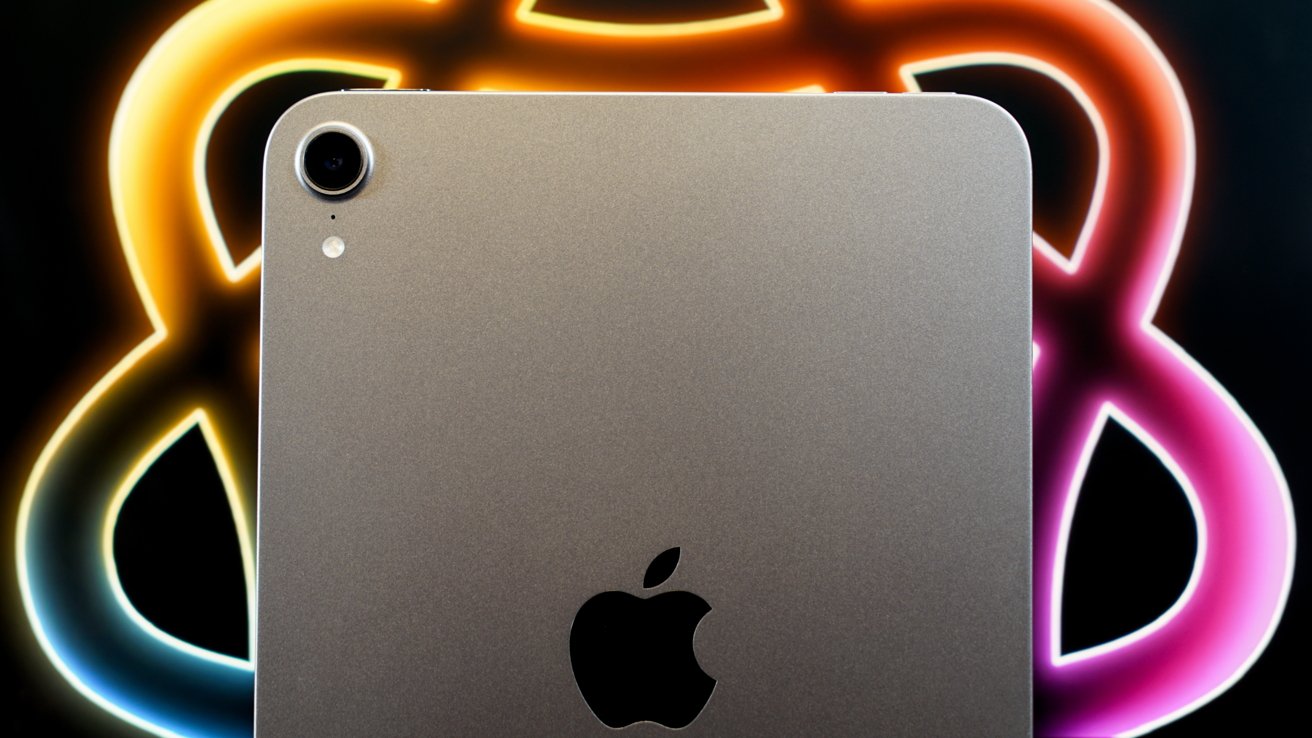
On-device, private AI is where Apple will win
It’ll be interesting to observe this metaphorical race going forward. There is an AI ceiling, at least on the consumer side in the near future, so I expect Apple will inevitably “catch up.”
Now if I haven’t beaten this metaphor to death just yet, allow me one last smack. The real loser in this race isn’t any of the competitors, but the observers.
The discourse has gotten so extreme, so silly, and out of the space of reality, that the consumers using artificial intelligence are the real losers here. We’ve all been robbed of something precious and had it packaged then sold back to us with a pretty bow and a guise of progress.
We were promised a revolution that would be either cataclysmic or life-changing. They said stealing all of the information on the web was necessary to change the world.
They even said that it was too hard and too expensive to pay for and properly credit this content, so for the most part, they just didn’t bother. Worse yet, the courts bought that argument.
We never got that revolution, but they did steal everything. We got better autocorrect and AI slop. They got record profits.
Every writer has a footprint, and a style. There are turns of phrase that they like using. For instance, our Managing Editor, Mike Wuerthele, can look at our texts blind and tell which one of us has written a piece without seeing a byline.
It’s disconcerting to see these turns of phrase stolen verbatim from a piece, mashed up with content from other venues, and then put forth as Google gospel at the top of nearly every search result.
Apple delays spell DOOM
If you’re a tech pundit looking for a clickbait headline, the only thing that’ll get more clicks than Apple being behind is apparently Apple delaying an expected feature. The company bit off a bit more than it could chew with its personalized Siri based on app intents that it showed off during WWDC 2024.
It’s not coming in iOS 18.4 and likely not at all in iOS 18.
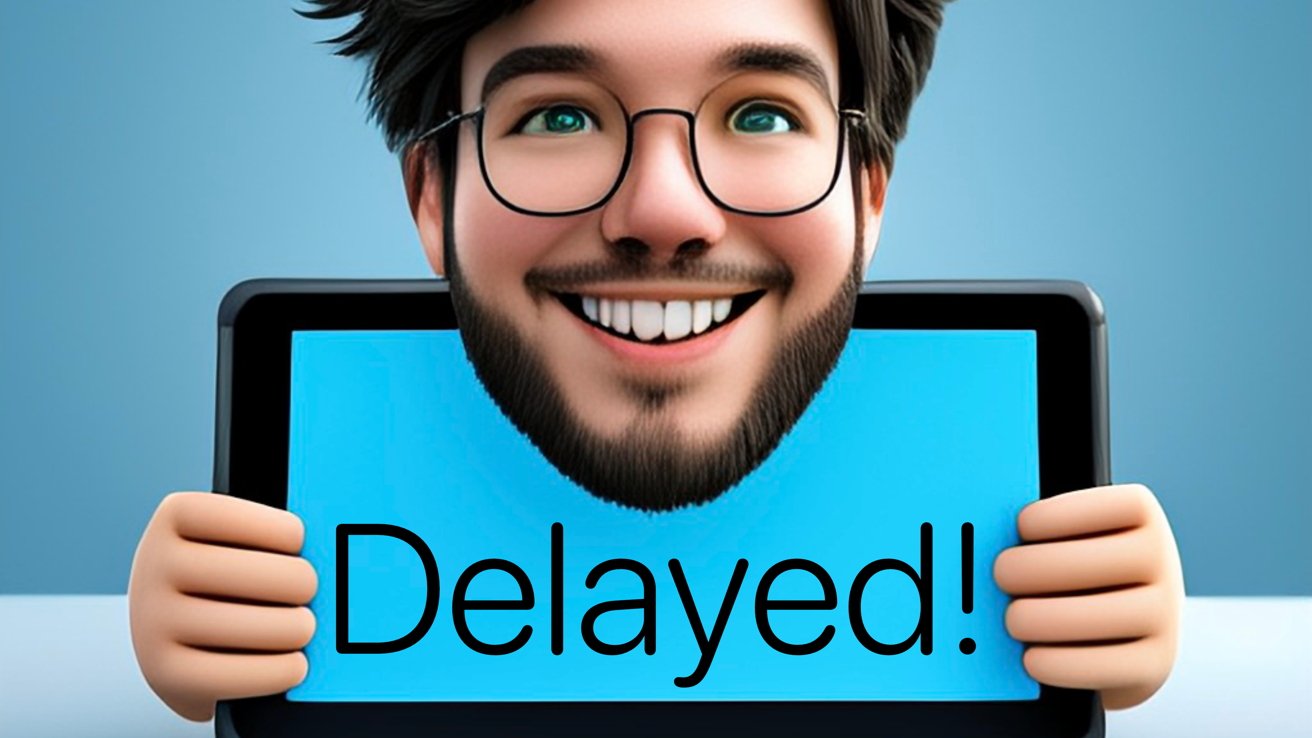
No really, Apple please, take all the time you need. We need better.
The whole concept was built on the existing app intents system that would allow Siri to understand what was on screen or buried within apps. It would allow the system to parse data found in separate places on the operating system, like Contacts showing who your mom is, Mail having an itinerary for a flight, Calendar having an event, and iMessage having a mention of an arranged ride.
All this could combine to result in an answer to a query to “when is Mom arriving?”
There are a few obvious problems with implementing the technology behind the feature. The system is incredibly complex and, like we’ve seen with summaries, it is prone to hallucination.
And unlike summaries, which are harmless if wrong, this new Siri can’t be wrong when dealing with crucial data and actions. If users have to go check the work of the AI, then there isn’t a point.

Apple Intelligence summaries are useful but don’t always get it right
All of this was being built on the old Siri model. Siri is still and would still be a machine learning model that accesses Apple Intelligence tools the same way it accesses app functions. And all that will be changing soon enough.
Perhaps Apple realized the key component to this app intent system for Siri is having Siri be an LLM as well. Whatever the reason, it isn’t coming before June.
The level of integration provided by app intents being tied to Siri and Apple Intelligence could have leapfrogged Apple ahead. It would be something visible, understandable, useful, and above all, private.
That said, the delay is good news for users. It’s a sign Apple has learned its lesson with pushing out Apple Intelligence features that aren’t ready for prime time.
The need to have AI in 2024 pushed some boundaries Apple was uncomfortable with, and things started breaking. The BBC wasn’t happy with notification summaries, and that was a black eye on Apple’s efforts.
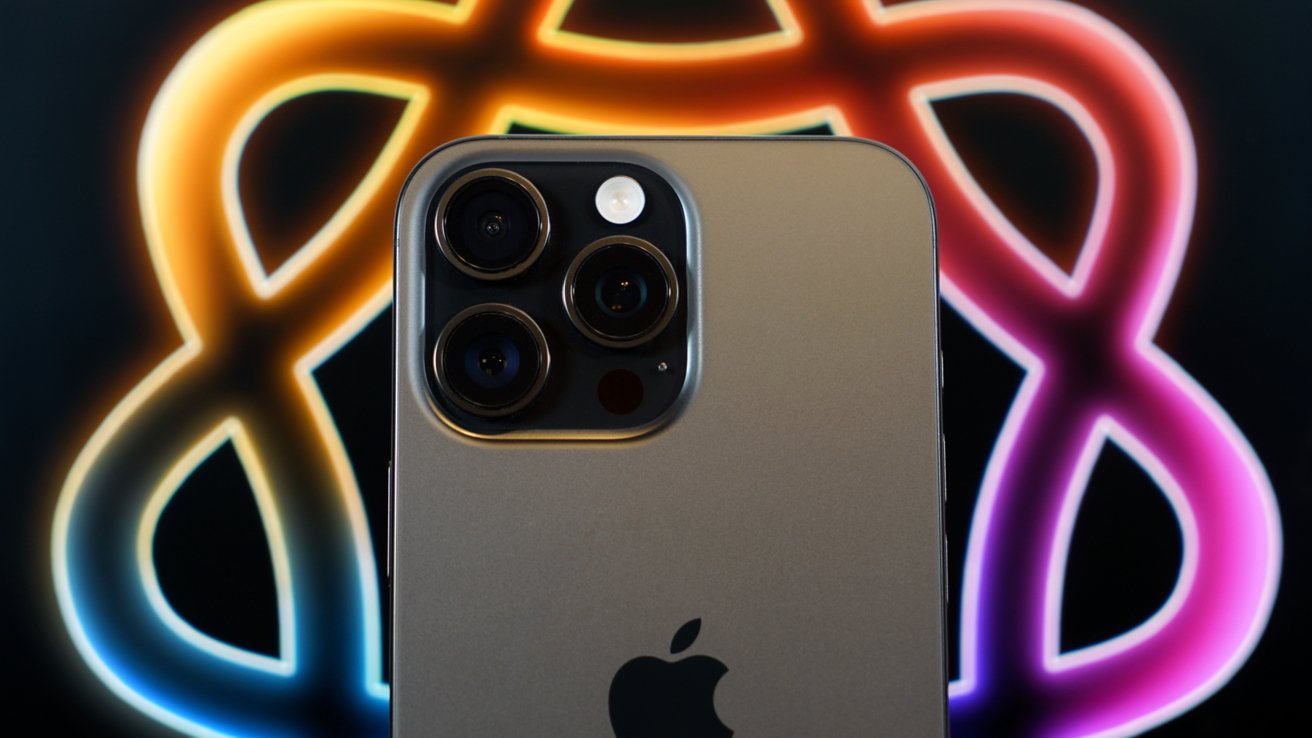
Apple can’t afford to ship a critical feature that gets details wrong
Now imagine that same issue but with getting details of your mother’s flight wrong. She probably doesn’t want to wait in the airport for a few extra hours, and you certainly don’t want to be circling or sitting in a parking lot for half of the day.
Of course, this, combined with Amazon’s announcements and ChatGPT’s 40th new model version this week, has Apple being labeled as “behind” again. In the grand scheme, in the public eye, I’m not going to say that’s necessarily wrong, but I wouldn’t bet against Apple either.
Apple was behind in the smartphone market, the tablet market, the smartwatch market, the headphone market, and the $3,500 headset market at one point. If we’re calling Apple behind here even though it is providing tangible benefits for users, so be it, but don’t bet against them being a bigger player soon.
Apple Intelligence has had a rough start. Public perception places Apple far behind the competition. Delays are inevitable as Apple’s need for perfection and security wins out over investor pressures.
Meanwhile, I’ll continue to benefit from Apple Intelligence and almost none of these other models as everyone yells about how behind they are. I’m excited for what’s next.
<
